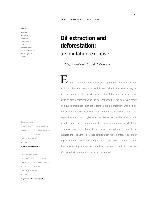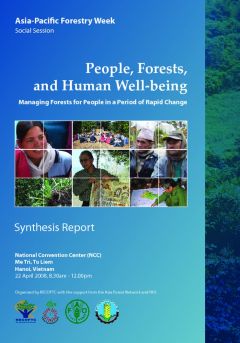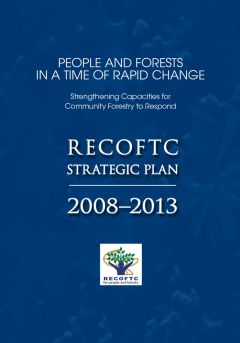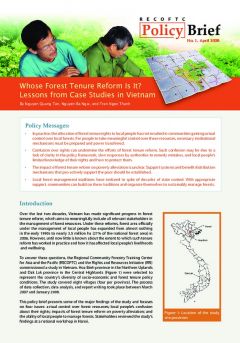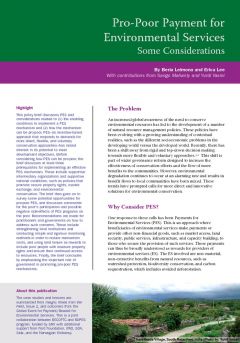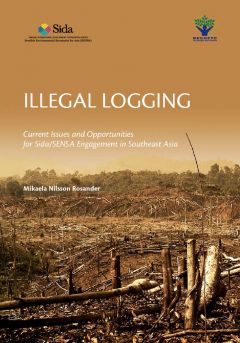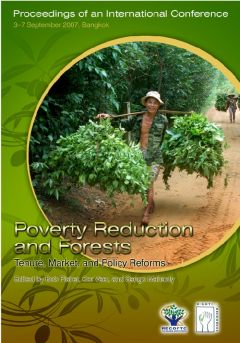People, Forests, and Human Well-being: Managing Forests for People in a Period of Rapid Change
Under present and foreseeable economic and social trends in the Asia-Pacific region, can we achieve sustainable forest management and better realize the potential of forests and forestry to contribute to improved human well-being?
People and Forests in a time of Rapid Change (Strategic Plan 2008-2013)
The Asia-Pacific region is experiencing rapid changes. There is a major need to strengthen capacities to assist countries and forestry stakeholders to respond in ways that benefit both people and forests.
Whose Forest Tenure Reform is it? Lessons from Case Studies in Vietnam
Over the last two decades, Vietnam has made significant progress in forest tenure reform, which aims to meaningfully include all relevant stakeholders in the management of forest resources. Under these reforms, forest area officially under the management of local people has expanded from almost nothing in the early 1990s to nearly 3.5 million ha (27% of the national forest area) in 2006.
Pro-poor Payment for Environmental Services: Some Considerations
PES is a new concept gaining momentum in the Asia-Pacific region.
Illegal Logging: Current Issues and Opportunities for SENSA/SIDA Engagement in Southeast Asia
Illegal logging and its associated trade remains a serious threat to forests and people in Southeast Asia. However, despite having caught the attention of the international community more than a decade ago, the illegal timber trade still accounts for a significant portion of wood and wood products from this region.
Community Forestry Management for Whom? Learning from Field Experience in Vietnam
The Forest Governance Learning Group (FGLG) Vietnam undertook a survey in Dak Lak and Thua Thien Hue provinces between December 2006 and April 2007. The survey aimed to provide insights into different forms of community forest management, the factors influencing its success, and their contribution to poverty alleviation.
Nepal's Community Forestry Funds: Do They Benefit the Poor?
Funds generated through community forestry offer crucial and significant resources for rural in Nepal. This study examines forestry funds in 100 communities in three districts to assess how large they are and how they are utilized. The study finds that the income from community funds increases local development resources by about 25%.
Climate change, deforestation and the fate of Amazon
Climate change, deforestation and the fate of Amazon. Understanding and mitigation the impact of the increasing population and global economic activities on tropical forests is one of the greatest challenges for scientists and policy makers. A summary of some of the latest findings and thinking on this topic has been reported by Malhi and colleagues in a recent paper published on Science.
Poverty Reduction Strategy.
Liberia’s Poverty Reduction Strategy (PRS) is built on the foundation of the Government’s 150-Day Action Plan. The PRS is part of a longer-term continuum of the Government’s strategy for rapid, inclusive and sustainable growth and poverty reduction, including progress toward achieving the Millennium Development Goals. The PRS covers the three-year period from April 2008 to June 2011.
Poverty Reduction and Forests: Tenure, Market, and Policy Reforms
RECOFTC and RRI co-organized the International Conference on Poverty Reduction and Forests: Tenure, Market, and Policy Reforms, which was held 3-7 September 2007 in Bangkok.
Plan d’Action du Haut Commissariat aux Eaux et Forêts et à la Lutte Contre la Désertification.
Le Plan d’action du Haut Commissariat aux Eaux et Forêts et à la Lutte Contre la Désertification (HCEFLCD) s’inscrit dans le cadre d’un programme décennal (2005-2014) qui consacre la multifonctionnalité des écosystèmes forestiers et vise (i) la lutte contre la désertification, (ii) la conservation et le développement des ressources forestières et (iii) le développement humain dans les espaces f

